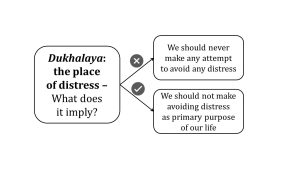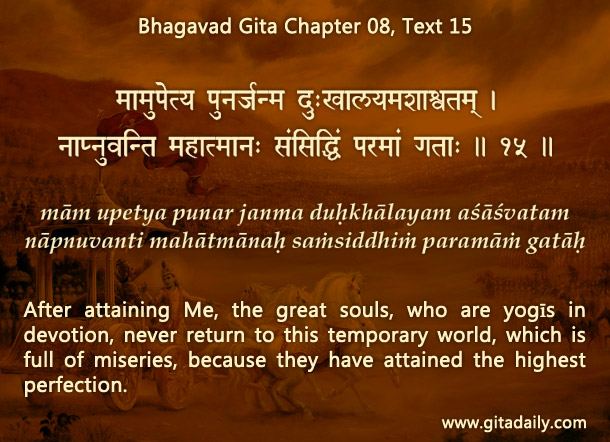 When the Bhagavad-gita (08.15) deems the world a place of distress (dukhalaya), what does this imply for our efforts to combat distress in our life? To understand, consider a parallel: the Himalayas, which, as the name indicates, is a place of ice and consequently cold.
When the Bhagavad-gita (08.15) deems the world a place of distress (dukhalaya), what does this imply for our efforts to combat distress in our life? To understand, consider a parallel: the Himalayas, which, as the name indicates, is a place of ice and consequently cold.
Suppose we are in the Himalayas and are feeling cold. We will naturally make efforts to avoid the cold, but we won’t be able to always avoid it entirely. Whenever we can find specific causes for the cold we are experiencing, we can and should try to fix those causes. But sometimes such causes may not be fixable. At those times, we need to endure the cold as well as we can. To persevere thus, we need a purpose that is meaningful enough for us to make the cold bearable. For example, if we aspire to scale a lofty mountain peak, the resulting inspiration may empower us to bear the trek’s unavoidable difficulties.
Similarly, that the world is dukhalaya means that while we will naturally strive to avoid distress, we shouldn’t make avoiding distress our life’s defining purpose. Why not? Because despite our best efforts, problems will sneak in somehow or the other. If we define our progress or success solely by how well we can avoid problems, we will set ourselves up for frustration. Instead, we can focus on finding a purpose that is meaningful enough for us to make life’s inevitable problems bearable. Helping us all find such a purpose is the purpose of Gita wisdom.
One-sentence summary:
The world is a place of distress — this doesn’t mean that we never make any attempt to avoid any distress; it just means that we don’t make avoiding distress our life’s primary purpose.
Think it over:
- What can the Himalaya metaphor teach us about the dukhalaya world?
- Focusing on avoiding problems leads to frustration — do you have any realization of this?
- ‘Focusing on a meaningful purpose can make problems bearable — do you have any realization of this?
***
08.15: After attaining Me, the great souls, who are yogis in devotion, never return to this temporary world, which is full of miseries, because they have attained the highest perfection.
To know more about this verse, please click on the image


JAPA sails over miseries